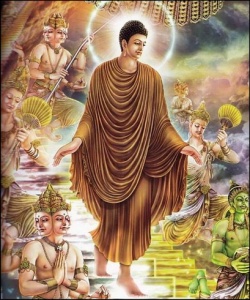Difference between revisions of "Fivefold view of revelation"
(Created page with "thumb|250px| <poem> '''fivefold view of revelation''' [五重三段] (Jpn goju-sandan ) An analysis of the Buddhist teachings that appears in The Ob...") |
|||
| Line 29: | Line 29: | ||
[[Category:Sutras]] | [[Category:Sutras]] | ||
[[Category:Nichiren]] | [[Category:Nichiren]] | ||
| − | [[Category:Lotus Sutra]] | + | [[Category:Lotus Sutra]]{{BuddhismbyNumber}} |
Revision as of 10:26, 22 April 2014
fivefold view of revelation
[五重三段] (Jpn goju-sandan )
An analysis of the Buddhist teachings that appears in The Object of Devotion for Observing the Mind, a treatise completed in 1273 by Nichiren. Revelation means the truth that Buddhas impart. A teaching of revelation is preceded by a teaching of preparation, which readies people to receive the truth; and is followed by a teaching of transmission, which urges that the truth revealed be transmitted to posterity. Chinese Buddhist scholars classified the sutras according to these three divisions: preparation, revelation, and transmission. In the above treatise, Nichiren applies the three divisions to
(1) all of Shakyamuni's teachings,
(2) the threefold Lotus Sutra (the Immeasurable Meanings Sutra, the eight-volume Lotus Sutra, and the Universal Worthy Sutra),
(3) the theoretical teaching (first half) of the Lotus Sutra,
(4) the essential teaching (latter half) of the sutra, and
(5) the teaching implicit in the "Life Span" (sixteenth) chapter of the sutra.
His purpose in so doing is to show that Nam-myoho-renge-kyo is the very teaching to be practiced and propagated in the Latter Day of the Law.A summary of the fivefold view of revelation is as follows:
(1) From the standpoint of all of Shakyamuni's teachings, preparation is represented by the sutras of the Flower Garland, Agama, Correct and Equal, and Wisdom periods, that is, the pre-Lotus Sutra teachings; revelation is represented by the threefold Lotus Sutra, and transmission by the Nirvana Sutra.
(2) From the standpoint of the threefold Lotus Sutra, preparation consists of the Immeasurable Meanings Sutra and the "Introduction" (first) chapter of the Lotus Sutra, revelation extends from the "Expedient Means" (second) chapter through the first half of the "Distinctions in Benefits" (seventeenth) chapter, and transmission includes the second half of the "Distinctions in Benefits" chapter through the "Universal Worthy" (twenty-eighth) chapter and includes the Universal Worthy Sutra.
(3) In terms of the theoretical teaching, preparation comprises the Immeasurable Meanings Sutra and the "Introduction" chapter of the Lotus Sutra, revelation extends from the "Expedient Means" chapter through the "Prophecies" (ninth) chapter, and transmission, from the "Teacher of the Law" (tenth) chapter through the "Peaceful Practices" (fourteenth) chapter.
(4) From the viewpoint of the essential teaching, preparation comprises the first half of the "Emerging from the Earth" (fifteenth) chapter, revelation includes the second half of the "Emerging from the Earth" chapter, the "Life Span" chapter, and the first half of the "Distinctions in Benefits" chapter (collectively known as "one chapter and two halves"), and transmission extends from the second half of the "Distinctions in Benefits" chapter through the "Universal Worthy" chapter and includes the Universal Worthy Sutra.
(5) In terms of the teaching implicit in the "Life Span" chapter, that is, Nam-myoho-renge-kyo, preparation is represented by the teachings of all the Buddhas of the ten directions throughout the three existences; revelation by Nam-myoho-renge-kyo, the Law implicit in the "Life Span" chapter; and transmission by the teachings of all the Buddhas read in the light of Nam-myoho-renge-kyo.

